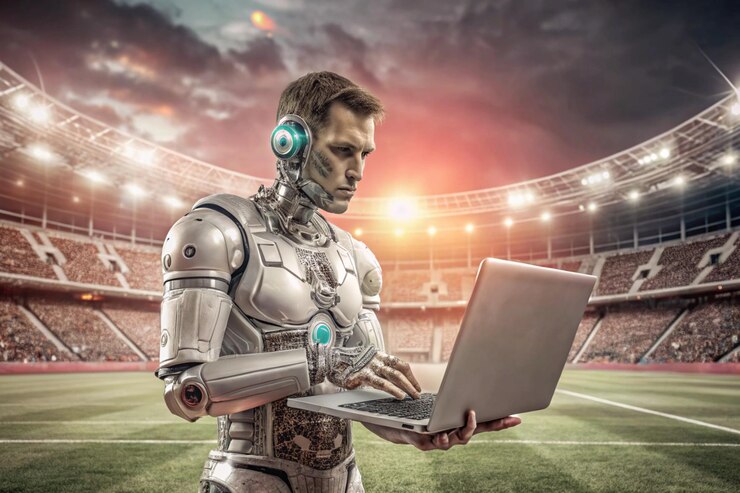Absolutely, yes AI is changing how we play sports, and it’s not just happening in some sci-fi lab. From the way athletes train to how games are coached and even how fans experience sports, artificial intelligence is now playing a bigger role than some assistant coaches.
What’s wild is that half the time, we don’t even realize it’s AI doing the heavy lifting. It’s quietly analyzing performance, spotting injuries before they happen, and even telling players what snack to eat after practice. Yes, seriously.
Now let’s break it all down without turning this into a tech class.
How AI Is Already Being Used in Sports (Right Under Our Noses)
If you think AI in sports means robots playing soccer, you’re not totally wrong but it goes much deeper than that. AI is already woven into the everyday world of athletes, coaches, broadcasters, and fans.
Take data analytics. Teams are using machine learning to study thousands of past games and plays. It tells them things like, “Hey, that move never works against left-handed players after halftime,” or “Shoot from this angle and your odds go up by 11%.” That’s not a coach guessing. That’s AI talking.
Even in amateur sports, AI tools are used to film games, track stats, and recommend drills. Platforms like Hudl or PlaySight use computer vision to break down a player’s movements like they’re in The Matrix. And yep, the system notices if your jump shot is a little wobbly or your sprint form is slightly off.
So if you’ve ever worn a smart watch that told you to “move more” while you were on the couch guess what? You’ve already been coached by AI.
AI and Athlete Performance: Training Like a Cyborg (But Without the Lasers)
Athletes at the pro level aren’t just training harder they’re training smarter, thanks to AI.
Coaches used to rely on video footage and gut feeling. Now, AI tools can analyze motion in real time. They know if your form is sloppy or your heart rate is off during drills. Tools like WHOOP and Catapult Sports collect insane amounts of data and spit out personalized advice. “Hey, don’t sprint today. Your muscles need recovery.” It’s like having a coach that never sleeps and never forgets anything.
The craziest part? AI can also help athletes mentally. Some platforms use brain-training AI to track focus, reaction time, and stress levels. So it’s not just the body getting trained it’s the brain, too.
Of course, athletes still have to do the work. AI isn’t lifting weights for anyone. (Yet.)
AI in Coaching and Strategy: Smarter Than Your Average Coach?
AI isn’t taking over the coaching world, but it’s definitely showing up with a laptop full of receipts.
Some AI platforms break down game footage faster than any human could. They spot patterns coaches miss like a tendency to pass left 70% of the time under pressure. That insight can win games.
Teams now use AI for predictive modeling. They can simulate a game before it even starts. Want to know what happens if you switch from man-to-man to zone defense halfway through the third quarter? AI already ran that scenario 10,000 times.
Even play-calling has changed. Some football teams, especially in college, are using AI-generated suggestions mid-game. It’s not as dramatic as a robot screaming “GO FOR IT ON FOURTH!” but it’s close.
Still, human coaches are very much in charge. AI is just the assistant with the best memory on the planet.
Wearables, Sensors, and Smart Equipment: The Rise of Robo-Gear
You know those fancy bands athletes wear on their arms or chest? That’s not for fashion. It’s data collection.
Wearable tech is one of AI’s favorite tools. It tracks things like heart rate, speed, jump height, hydration levels, even sleep patterns. And not just during games it follows you 24/7. If you had one of these, it would probably yell at you for eating pizza after midnight.
Smart shoes, smart basketballs, and even smart soccer balls exist. They track how hard you kick, how accurate you shoot, and how fast you run. Then they sync with AI systems that analyze all that info and give real suggestions.
It’s like turning your gear into a coach, therapist, and personal trainer all in one.
AI in Injury Prevention and Recovery: Saving Knees Since 2019
Injuries are a huge problem in sports and AI is trying to fix that.
Using predictive models, AI can analyze your movements and detect when you’re about to get hurt. Seriously. If you’re putting too much pressure on one knee or overusing your shoulder, the system throws up a red flag.
Rehabilitation is smarter too. AI tracks how your body responds to therapy, then adjusts the recovery plan in real time. No more guesswork. Just data-backed healing.
One soccer club even caught a player’s injury two weeks before it happened all thanks to AI tracking tiny movement changes. That’s basically sports magic.
Changing the Way We Watch and Play: AI in Broadcasting, Gaming & Fan Interaction
AI isn’t just changing what happens on the field it’s transforming how we watch it too.
Sports broadcasters now use AI to create instant highlight reels. The system knows which plays made fans cheer the loudest and cuts the video without needing a sleepy intern. And subtitles? Automated. Camera angles? Chosen by AI based on player positions.
Fan experiences are evolving too. Want real-time stats while watching a game? AI overlays it live. Want to scream at a virtual coach in a game simulator? That’s becoming a thing.
Even in video games like FIFA and NBA 2K, AI opponents have gotten way smarter. They adapt, learn, and sometimes play better than you do. (Which can be annoying. And humbling.)
Limitations and Concerns: Is AI Replacing Humans or Just Helping?
Here’s the thing: AI is awesome, but it’s not perfect.
It needs tons of data to work. And if that data is bad or biased, the results will be too. Not to mention, some folks worry that relying too much on AI might make sports less human. Where’s the heart? The grit? The wild, unexpected moments?
Also, AI doesn’t have “gut feeling.” Coaches and players still make judgment calls. Sometimes you just know a play will work — even if the numbers say no.
So no, AI isn’t replacing humans in sports. But it is making them a whole lot sharper.
What’s Next? The Future of AI in Sports Training and Play
Let’s talk future because it’s coming fast.
Soon, athletes may train in fully simulated environments, with AI creating opponents based on real data. Smart glasses might offer real-time advice during play. “Pass now. Defender moving left.” Imagine hearing that mid-dribble.
AI might also give youth and amateur athletes access to elite-level analysis. No more guessing. Everyone from weekend warriors to rising stars could have their own personal AI coach.
But while the tech keeps leveling up, the soul of sports will always stay human. AI can guide us but it can’t replace the feeling of hitting a game-winner or diving for a save.
Conclusion: So… Is AI Really Changing Sports?
No doubt about it AI is changing sports in ways we never imagined. It’s helping players train better, coaches plan smarter, and fans experience the game in new ways.
But it’s not here to take over. It’s here to make us better one smart pass, one data point, and one weirdly accurate prediction at a time.
And hey, if AI can also predict when to avoid leg day… we might be okay with that.
FAQ: AI and Sports
How is AI used in sports today?
AI is used for performance analysis, injury prevention, coaching strategies, smart equipment, and enhancing fan experiences through real-time data and highlights.
Can AI replace human coaches?
Not entirely. AI supports decision-making with data, but it can’t replace human intuition, leadership, or experience on the sidelines.
What sports are using AI the most?
Football, soccer, basketball, tennis, and even esports are heavily investing in AI tools for training and analysis.
Is AI safe to use in sports?
Yes, when used correctly. However, overreliance or bad data can lead to poor decisions. Human oversight is still needed.
Will AI take the fun out of sports?
Only if we let it. AI can enhance the game, but the emotion, unpredictability, and passion will always come from the players and fans.






